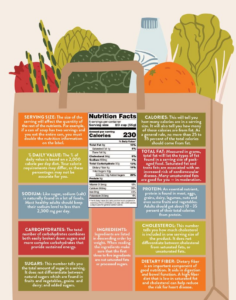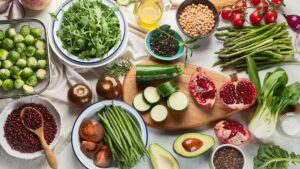
One of our favorite fun facts is “you are what you eat.” We consume and absorb the energetic stores of different plants and animals. Reflecting on this energetic transfer that is inherent to survival, our very biology depends on what we eat, and the quality of the food influences how it is processed in our bodies.
Pulling from an evolutionary mindset, the human body has evolved under conditions where food availability fluctuated with the seasons. We co-evolved with a variety of food sources, and our bodies have genetically adapted to the cycles of seasons that coincide with these rhythmic harvests. This history suggests that our bodies are better adapted to digest and utilize foods that are naturally available at certain times of the year. Thus, the concept of eating seasonally is not just about savoring the freshest produce but also about aligning our diets more closely with the metabolic efficiencies that have been developed for millenia. Fascinating emerging research about seasonal eating is helping to explain why it is not only advantageous but natural to incorporate seasonal mindfulness into your diet.
Nutritional Content Changes with the Seasons

Eating foods that are in season offers significant nutritional benefits. Plants receive the optimum levels of sunlight, water, and nutrients during their natural growing periods, which means they are richer in vitamins, minerals, and antioxidants when harvested at peak ripeness. Crops such as oranges that are grown in season contain higher levels of vitamin C, crucial for immune system function and stress resilience.
What’s more is that our bodies respond to the different types and amounts of compounds produced by fruits in different seasons. The “xenohormesis hypothesis” states that animals’ bodies receive information about the environment through the food that is consumed seasonally. For example, let’s look at polyphenols. Polyphenols are micronutrients with antioxidant and anti-inflammatory properties, and they give fruits and vegetables their vibrant colors. Concentrations of polyphenols in plants will vary given the time of year and the amount of environmental stressors placed on the plant (amount of water, sunshine, soil composition, etc). Research indicates that our bodies respond differently to the various polyphenols that are produced; metabolic responses to eating fruits, including fat storage and oxidative stress, have been shown to vary depending on whether these fruits were grown in season or out of season.
Of course, seasonal foods are also location dependent. Sources of food depend on natural and human-made resources. We now have the ability to ship crops across the world so that we may take advantage of seasonal diversity. However, one benefit of focusing on eating locally is introducing the body to the local landscape; for example, while controlled studies have not yet been attempted, there is still some limited evidence that eating local honey might reduce allergic responses to pollen. Not to mention, eating locally is environmentally and economically sustainable!
Let us also not forget that eating local, seasonal foods that have just been harvested tend to taste better than those that have traveled from afar. Fresh, nutrient-dense fruits and vegetables that are more pleasurable to eat will encourage increased consumption of plant-based diets. Fiber, along with antioxidants and other anti-inflammatory compounds, is a key component of a healthy gut-brain connection (read our blog on fiber for more information).
Incorporating Seasonal Foods into Diets
Educational Awareness: Keep track of what’s in season based on your location by using seasonal food charts or apps that identify when different produce is at its peak.
Connecting with Local Farmers: Visiting local farmers’ markets will not only support the local economy but will also provide you with the opportunity to connect directly with the source of your food. Joining community supported agriculture (CSA) networks commits you to weekly, fresh produce from farmers in your area.
Seasonal Recipes and Creative Cooking: Research, share, and create your own recipes that highlight the flavors and benefits of seasonal produce. While cooking can be a therapeutic activity for many, it is also a fun challenge for those who have invested in a CSA.
Integrating Mindful Eating Practices: Mindful eating is a sensual practice that can help you focus on experiencing the taste, texture, and aroma of seasonal foods. This practice can deepen the appreciation for fresh, flavorful meals and encourage a slower, more thoughtful approach to eating. Are you able to identify when a fruit or vegetable tastes especially delicious or when you are craving something in particular?
Grow Your Own: Starting a garden is a great way to control seasonal eating and cultivate appreciation for farming, for those with the time, energy, and ability to do so. Gardening is often described as a peaceful and grounding activity, and it boasts numerous physiological and mental health benefits.
Conclusion

Orienting toward a diet rich in seasonal foods is not merely dietary advice—it is a holistic approach that respects the body’s natural rhythms and evolutionary history. By embracing seasonal eating, we can align more closely with the natural world around us and improve our nutritional intake, supporting our mental health through optimized brain-body signaling. In this way, seasonal eating nurtures the mind-body-spirit, reinforcing the interconnectedness of our health with the world around us.







